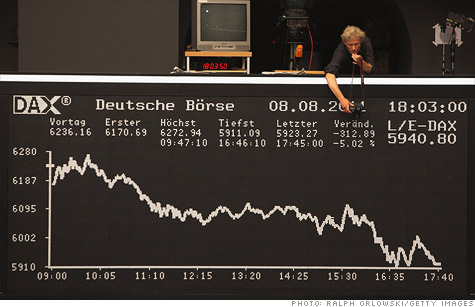
European markets have been hammered over the past month.
NEW YORK (CNNMoney) -- The debt crisis that started in the outskirts of Europe took another step toward the continent's core economies on Thursday as lawmakers scrambled to put policies in place to stem the bloodletting.
European stock exchanges closed higher. But the trading sessions were volatile. And in a manifestation of the sky-high levels of fear pumping through the markets, speculation ran unchecked.
The result is a continent on edge.
"There is a great deal of nervousness, and a great deal of uncertainty in the markets," said Nick Matthews, a senior European economist at the Royal Bank of Scotland.
At its core, the crisis in Europe is the result of heavy debt burdens taken on by countries that are bound by a common currency and central bank. (Read: European markets surge, slump, and surge again!)
The high government debt loads threaten to trap countries in a vicious cycle: The debt weighs on economic growth -- and austerity measures aimed at attacking the debt only put a further drag on their economies.
Greece and Ireland stumbled last year, and billions of dollars were spent by their neighbors in an effort to contain the panic. The lending and bond-buying efforts undertaken by Europe's stronger economies prevented a default, but systemic reforms remain elusive.
And now, after evolving for more than a year, the crisis is knocking on the door of Italy and France, two of the continent's largest economies.
France has a relatively high level of sovereign debt, and is one of the few remaining countries with a AAA rating -- a distinction that has been called into question in some quarters after Standard & Poor's downgrade of the United States' rating.
Despite affirmations from rating agencies, rumors that a downgrade to France's credit rating was imminent sparked an all out assault on the country's banking sector over the past two days.
Adding fuel to the flames, Reuters published a report Thursday citing anonymous sources that an unnamed Asian bank had suspended lines of credit to French lenders.
European policymakers, some of whom have already cancelled their summer vacations, have started to pull levers in a bid to turn the tide.
French President Nicolas Sarkozy and German Chancellor Angela Merkel said Thursday they were calling another emergency meeting to discuss the crisis.
And over the weekend, the European Central Bank signaled that it would begin buying Italian and Spanish bonds -- a move that has successfully lowered borrowing costs for the two governments.
But bond yields remain elevated across the region as investors demand higher interest rates in exchange for holding government debt.
The yield on Italian and Spanish 10-year notes is above 5%, while Greece sits above 15% and France's rate has spiked above 3%.
Coupled with weak growth, the sharp increase in interest rates only adds to the countries' debt and makes it even more difficult for them to dig out of their holes.
The chaos has led policymakers to consider extraordinary measures that would have been unthinkable only weeks ago.
There was speculation that European regulators are considering a ban on short selling -- a bet against a stock that can quickly drive shares lower.
And Switzerland's central bank hinted it may temporarily peg the value of the Swiss franc to the euro in an effort to stem the franc's rapid strengthening -- an unprecedented move.
The Swiss franc is a safe-haven currency, and its value has been driven ever-higher by fear in Europe. A senior official at the country's central bank said the currency is now "massively overvalued" compared to the dollar and euro during an interview with Tages-Anzeiger newspaper.
The panic is not only manifesting in bond yields and currencies -- it's also hitting equity markets.
Shares trading on the main French (CAC40) and German (DAX) exchanges have lost almost 20% of their value over the past month, while even Britain's main exchange has dropped 14% over the same time period.
Matthews said the debt worries are one thing, but S&P's decision to downgrade the United States and economic indicators that point to a global slowdown are further complicating matters for investors.
"Given some of the indicators we've had, this is a justified concern," Matthews said. "There is a clear slowing down." ![]()
| Overnight Avg Rate | Latest | Change | Last Week |
|---|---|---|---|
| 30 yr fixed | 3.80% | 3.88% | |
| 15 yr fixed | 3.20% | 3.23% | |
| 5/1 ARM | 3.84% | 3.88% | |
| 30 yr refi | 3.82% | 3.93% | |
| 15 yr refi | 3.20% | 3.23% |
Today's featured rates: